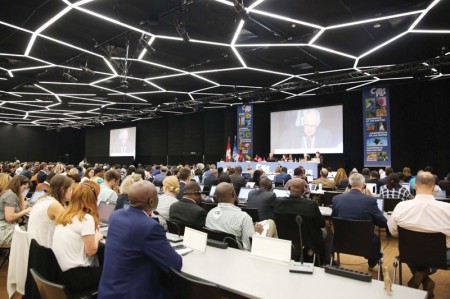SADC realises the 'T' in CITES is silent
Mbongeni Mguni | Friday August 30, 2019 12:35


Government and non-governmental officials representing several Southern African countries returned from CITES’ Geneva meeting enraged this week.
The Conference of Parties (a general assembly of sorts) of the Convention on International Trade in Endangered Species (CITES) overwhelmingly rejected all the proposals the region had made on selling its ivory stockpiles.
Even last minute compromises, such as allowing a once-off sale of the stockpiles, then closing the market for six years, were soundly rejected by a meeting that appeared to have built a bulwark against the proposals even before countries set foot in Geneva.
For Botswana, Zambia, Namibia, South Africa and Zimbabwe, being the countries pushing for the sales and relaxed listings, the CITES’ snub was particularly bitter as it was led by 32 fellow African states calling themselves the African Elephant Coalition.
Members of the Coalition include countries such as Nigeria, Benin, Chad, Comoros, Equatorial Guinea, Burundi, Gambia, Liberia, Ghana and others.
They also include countries that Botswana considers traditional allies such as Kenya, South Sudan and Rwanda.
While the five Southern African states pushing the proposals are estimated to have up to 80% of the world’s pachyderms between them, the African Elephant Coalition has a smattering of elephants, their numbers eroded by state-sponsored corruption and war.
Smarting from the betrayal, some SADC member states are scheduled to meet on a possible withdrawal from CITES, the global body responsible trade in endangered species. CITES members are allowed 90 days to register a dispute.
Speaking from Geneva by phone, Botswana’s environment minister Kitso Mokaila said Botswana would carefully weigh the risks of leaving CITES.
“Leaving CITES is a very complicated issue and full of risks,” he told Mmegi.
“It risks our diamond industry, tourism and the risk of Botswana being blockaded.
“We are fully aware of that but we have to create something that speaks to conservation.
“We are saying let’s come back to southern Africa and talk.
“We have 90 days to put in a reservation or declare a dispute and look at what other UN mechanisms are in place to allow us to breathe because where we are as Botswana and southern Africa, it’s not feasible to continue the way we are with human/animal conflict, droughts and others.
“It’s not sustainable and it’s against the SDGs themselves.”
SADC has already fired shots at CITES, using the closing plenary to take a stand.
“We have been committed parties to CITES since its inception or our accession to it and would wish to remain so,” said Elisante Ombeni Leguma, a Tanzanian state official, reading the official SADC position.
“But we can no longer ignore these glaring shortcomings and threats to our national interests and to our commitments to the broader multilateral context.
“The time has come to seriously reconsider whether there are any meaningful benefits from our membership to CITES.”
SADC also condemned the “dominance both at meetings of the decision-making structures of CITES and in their run up” of “protectionist NGOs whose ideological position has no basis in science or experience and is not shared in any way by the SADC member states”.
The ‘protectionist NGOs’ not only aggressively lobbied African states in Geneva, but are believed to have engaged in vote-buying and bribing of delegates in order to swing the vote against Southern Africa.
While Southern African states’ proposals for once-off ivory sales and other relaxations have repeatedly been rejected over the years, this year’s groundswell of opposition, the African ‘betrayal’ and stench of corruption has the region wondering whether CITES is still spelt with a ‘T’ in the middle.
In the next 90 days, SADC or the individual states most affected by species’ overpopulation and disgruntled communities will have difficult decisions to make.
